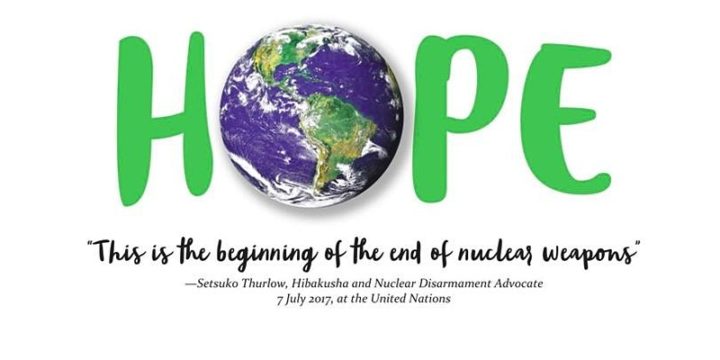Toronto’s Setsuko Thurlow—a survivor of the atomic bombing of Hiroshima—has urged Prime Minister Justin Trudeau to acknowledge the extensive Canadian government involvement in the creation of the first atom bombs that destroyed Hiroshima and Nagasaki on August 6 and 9, 1945. She requested that the Prime Minister issue a statement of regret for the immense deaths and suffering inflicted on the two cities and asked that Canada ratify the UN Treaty on the Prohibition of Nuclear Weapons.
Birth of the Nuclear Age:
Thurlow submitted her appeal to the Prime Minister three weeks before the 75th anniversary of the first American test of an atom bomb in the New Mexico desert on July 16, 1945. It was made of plutonium, the same weapon used against Nagasaki three weeks later. Hiroshima was destroyed by an atom bomb made from uranium. By the end of 1945, over 140,000 people had perished in the nuclear strike against Hiroshima, which Thurlow witnessed as a thirteen-year old. Another 70,000 died in the atomic bombing of Nagasaki.
Thurlow jointly accepted the Nobel Peace Prize on behalf of the International Campaign to Abolish Nuclear Weapons in 2017. Thirty-nine countries have ratified the UN Ban Treaty. But it needs eleven more nations to ratify for the treaty to become international law. Canada could break the ratification logjam stopping the Treaty from coming into force.
In her brief to Prime Minister Trudeau, Mrs. Thurlow pointed to the Mackenzie King government takeover of Eldorado Gold Mines Limited in 1942 costing $4,900,000 ($75,500,000 in 2020) and the company’s nationalization by the government in January of 1944. Eldorado’s refinery in Port Hope, Ontario, refined all the uranium ore from Canada and the Belgian Congo used by the Manhattan Project to produce the first nuclear weapons for the American Army.
At the direction of C.D. Howe, King’s Minister of Munitions and Supply, the Consolidated Mining and Smelting Company in Trail, B.C. also signed contracts with the Manhattan Project in November of 1942 to produce heavy water for nuclear reactors to produce plutonium.
In August of 1943, Mackenzie King hosted President Roosevelt and British Prime Minister Winston Churchill in Quebec City where they signed the Quebec Agreement to jointly develop the atom bomb. C.D. Howe represented Canada on a Combined Policy Committee that co-ordinated the joint research by the U.S., the United Kingdom and Canada on creating atomic weapons. Mackenzie King affirmed in his diary that the Quebec Agreement “made Canada also a party to the development.”
The National Research Council of Canada was heavily involved in the Manhattan Project and in the research by British scientists to develop the atom bomb. In April of 1944, King’s Cabinet War Committee approved an expenditure of up to $4,000,000 capital [$59,825,000 in 2020] and $750,000 [$11,217,000 in 2020] in operating expenses for the National Research Council to design and operate nuclear reactors in Montreal and at Chalk River, Ontario, whose discoveries about the production of plutonium would be shared with the U.K. and the Manhattan Project.
The federal government has accepted liability for the “historic” low level radioactive uranium wastes of Crown Corporation Eldorado Nuclear Ltd. in Port Hope, Ontario. It is paying for a $1.28 billion clean-up of 1.65 million cubic metres of radioactive waste there and in nearby Port Granby through Natural Resources Canada and Atomic Energy of Canada Limited with Canadian Nuclear Laboratories. The process is licensed by Canada’s regulator, the Canadian Nuclear Safety Commission.
The federal government is only cleaning up what it decides from testing is “historic” waste from Eldorado Nuclear Ltd. dumped in Port Hope until 1988 when the Crown Corporation was privatized as Cameco Corporation, the world’s second largest uranium producer. The federal government has rejected any liability for the cancers and other illnesses resulting from the uranium contamination in both Port Radium and Port Hope.
Setsuko Thurlow obtained a master’s degree in social work from the University of Toronto in 1960 and was awarded an honorary doctorate from the University in 2019. She has organized commemorations of the atomic bombings in Toronto since 1975 when David Crombie was Mayor. Her testimony before the Toronto Board of Health and Toronto City Council in 2018 resulted in Mayor John Tory and City Council reaffirming Toronto as a nuclear weapons free zone and passing a motion calling on the federal government to sign the UN Ban Treaty.
Thurlow’s appeal to Prime Minister Trudeau has been endorsed by the Canadian Network to Abolish Nuclear Weapons, the Canadian Pugwash Group, the Canadian Coalition for Nuclear Responsibility, the Canadian Voice of Women for Peace, the Hiroshima Nagasaki Day Coalition, Science for Peace, the International Physicians for the Prevention of Nuclear War Canada, and Project Ploughshares.
The Hon. Douglas Roche, former Senator and former Canadian Ambassador for Disarmament, stated that “Setsuko Thurlow’s important letter to Prime Minister Trudeau should be widely distributed to all Members of Parliament and Senators and civil society leaders.”
Because of Covid-19, Thurlow will participate in virtual commemorations on August 6 organized in Ottawa by the Canadian Network to Abolish Nuclear Weapons and in Toronto by the Hiroshima Nagasaki Day Coalition.
The full text of Setsuko Thurlow’s appeal to the Prime Minister is posted on the Hiroshima Nagasaki Day Coalition website http://www.hiroshimadaycoalition.ca along with the background brief, “Canada and the Atom Bomb” she submitted to Justin Trudeau along with her letter.










